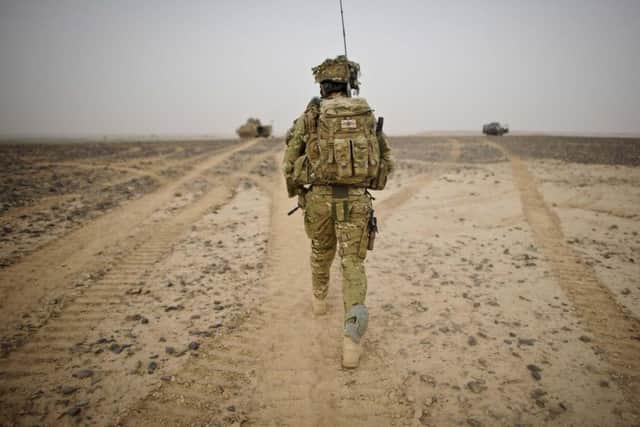Jayne Dowle: We must not abandon our war veterans to fight their own demons as PTSD suicide toll grows
This is disturbing enough. What is worse is that there is no reliable data easily available on the apparently rising number of service personnel suicides. Out of 98 coroners in England and Wales, and their equivalents in Scotland and Northern Ireland, contacted by The Yorkshire Post’s publisher Johnston Press, just one was able to provide data on the number who have taken their lives since 2015.
It’s clear that the United Kingdom has no reliable system in place to track causes of death among the nation’s 2.6 million veterans, despite evidence that thousands struggle with serious mental health problems like PTSD. This is in stark contrast to our allies. The United States and Canada monitor their ex-military personnel for life.
Advertisement
Hide AdAdvertisement
Hide AdThat’s why the situation needs addressing, and fast. In the first instance, it demands a cross-party response. Leading campaigner Rose Gentle, whose 19-year-old son Gordon was killed in Iraq in 2004, has said it is “wrong” that suicide data is not available. She believes the Government is “embarrassed” by the problem.


Even the former head of the Royal Navy, Admiral Lord West, says he is “very surprised” at the absence of records, adding it would “make absolute sense” to collect data.
To be fair, after years of criticism, Ministers have finally begun to put significant resources into mental health provision for both serving personnel and veterans, amounting to £22m a year for the next decade. Among measures launched in the last 18 months is an online “Veterans’ Gateway” to streamline access to help and a tailored NHS service to help personnel leaving the Armed Forces. A Veterans’ ID card to allow ex-servicemen and women to identify themselves and access services is also in the pipeline.
If they can do all this, then surely there should also be an overhaul of the way that services suicides are recorded. One coroner said that a computer system “as old as Noah” prevents identification of veterans as a specific group in recording suicide statistics. Why is this?
Advertisement
Hide AdAdvertisement
Hide AdAnother coroner recommends that the matter be referred to the National Suicide Prevention Group. I’d say this was mandatory. I’d also argue that high-profile mental health campaigners, including Princes William and Harry, who both have distinguished military service under their belts, should get on board.
There’s clearly a disconnect between public perception and private suffering. I would never disrespect the solemn purpose of Remembrance Day, nor question the hard work that selfless individuals put into the national efforts to honour our war dead.
Perhaps this November, organisers and supporters might also wish to bring to public attention the plight of those so traumatised by conflict that they find themselves suffering mental health problems of such severity.
And let’s not forget their families, looking on at the proud marching bands and laying of wreaths. Among the former soldiers to have taken their lives this year was 29-year-old Kevin Williams. He was deployed on his 18th birthday, the youngest British soldier to fight in Iraq. He took his own life in March after being diagnosed with PTSD and failing to keep appointments for treatment.
Advertisement
Hide AdAdvertisement
Hide AdIf my son had killed himself as the result of his combat experience, I am afraid that my Remembrance Day pride would be stained with bitter tears.
The Army is supposed to look after its own. On this evidence, that duty of care only goes so far. Simon Maryan, a former Royal Marine who jointly heads Veterans United Against Suicide UK, says he has he seen a rise in suicides and suicide attempts since the beginning of 2017.
He said: “When you leave the forces in the UK the Ministry of Defence essentially washes its hands of you – you become the responsibility of the civilian sector. It is unforgivable that we have no proper way of recording whether a suicide involves a veteran.”
He joins his voice to others, including former England footballer Terry Butcher, who last year lost his son, Christopher, a captain in the British Army who served in Afghanistan. He was just 35. Christopher battled post-traumatic stress disorder (PTSD) and turned to drug use. At the inquest, the corner concluded he died of an abnormal enlargement of the heart combined with effect of drugs against a background of PTSD. His father said simply that he was “a victim of war”.
Soldiers are taught to deal with clear and present danger. They should not be expected to fight a hidden battle alone when they come home. And neither should their families.